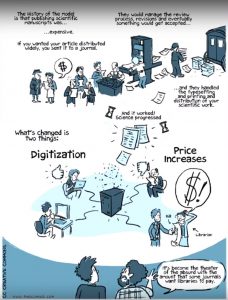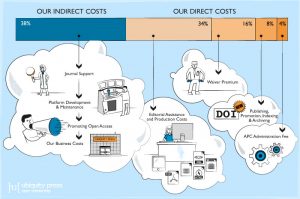Topic
|
Subscriptions and Open Access
|
| Key Takeaways |
- Fees for access are not the only possible source of revenue for publishers, and charging publication fees to authors is a common practice.
- There are implications of subscription vs open access models in terms of access to information for readers and access to publication opportunities for authors
- (Advanced/Extension) There are nuances to open access models (e.g., hybrid journals) and alternatives to simple author-pays (e.g., “green” open access or library sponsorship initiatives).
|
|
Notes for the instructor/librarian
|
This topic explores publishing business models, and may only be relevant for instruction sessions where the librarian is able to devote significant time to scholarly communication topics. It could be used as an extension to “sticker shock” topics, or possibly when discussing paywalls or information privilege. It might arise naturally in student discussion of those topics, and so could be useful to have considered in advance.
|
| Lesson Content |
Below you will find a variety of ways to briefly address this topic. Pick, choose, and adapt as you like. |
| Quick Mentions |
- “How much do you think authors of scholarly articles are paid?” Briefly mention that, in contrast to commercial writing and to most books (including scholarly ones), they are not paid. Peer reviewers aren’t paid either….
- Aside from high profit margins made by some for-profit publishers, there are legitimate costs associated with running a journal. If a journal is free to read, these costs aren’t recovered through subscriptions. The most common way to fund these journals is through fees paid by authors….
- Open access publications are typically not just free to read but are also released under a license that permits some level of sharing and reuse, such as CC-BY. Briefly explain the differences between copyright and open licenses.
- Open access isn’t just for journal articles. If relevant to the course, you could mention various open textbook initiatives, library-funded projects like Knowledge Unlatched, and/or publicly-funded resources like the NCBI Bookshelf.
|
| Discussion Questions |
- What kinds of information do you pay to access? For the information you access without paying, how is its creation funded?
- [If following discussion of information privilege or similar topic] We’ve talked about disparities created by charging readers for access to information. What disparities could arise when authors have to pay in order to publish their work?
- Have you encountered Creative Commons or other open licenses? What do they mean? Would you publish your work under an open license? Why or why not?
- A great deal of research is funded with taxpayer money, for example by NIH or NSF in the United States. Sometimes these funders require open access versions of the resulting publications to be made available, perhaps after some delay. What are the benefits of these policies? What are the potential problems? For the public, for the researchers, for other stakeholders?
|
| Visuals & Media
(See all content in Google Drive) |

- On the topic of what it costs to run a journal, some OA publishers are quite transparent. See image below from Ubiquity Press, which charges low APCs starting around $550US https://www.ubiquitypress.com/site/publish/

|
| Student Readings |
- Abraham, J. (2014). Deciding who should pay to publish peer-reviewed scientific research. The Guardian. Retrieved from https://www.theguardian.com/environment/climate-consensus-97-per-cent/2014/sep/18/who-should-pay-to-publish-scientific-research (A brief, accessible article about publishing business models from the author’s perspective.)
- Gershman, S. (2014). The Exploitative Economics of Academic Publishing. Footnote. Retrieved from http://footnote.co/the-exploitative-economics-of-academic-publishing/.
- Larivière, V., Haustein, S., & Mongeon, P. (2015). The Oligopoly of Academic Publishers in the Digital Era. PLOS ONE, 10(6), e0127502. doi:10.1371/journal.pone.0127502 The 2015 paper from which we get the widely used quote about more than half of the of the scholarly publishing market being controlled by five for-profit companies. There are many popular articles on this topic and/or based on this study.)
|

